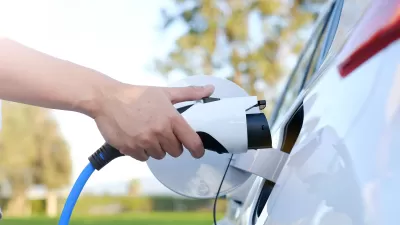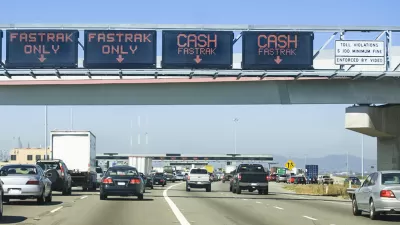A new study from the Tax Foundation starts with the premise that user fees - gas taxes and tolls, should pay for road funding. All 50 states are evaluated to see the greatest percentage of user fees. Delaware is rated first; Alaska and Wyoming last.
Joseph Henchman, attorney and policy analyst for the Tax Foundation, writes that the "lion’s share of transportation funding should come from user taxes and fees, such as tolls, gasoline taxes, and other user-related charges. When road funding comes from a mix of tolls and gas taxes, the people that use the roads benefit from them and should bear a sizeable portion of the cost."
Henchman includes a table showing the share of road spending derived from all user fees, though primarily gas taxes and tolls, for each state, and another column that includes all transportation spending, i.e. including public transit.
Each state is ranked according to the percentage of user fees paying for roads and another rank for all transportation programs, including transit.
Delaware and Florida are ranked first and second, respectively while Alaska and Wyoming ranked 50 and 49, respectively.
In total for the nation, "highway user taxes and fees made up just 32 percent of state and local expenses on roads; (t)he rest was financed out of general revenues, including federal aid", Henchman writes.
When states have a very low percentage of transportation funding coming from user fees, like Alaska and Wyoming, with mostly general revenue used to maintain the roads, the perception is that they are "free, and consequently, overused or congested—often the precise problem transportation spending programs are meant to solve.
Henchman's recommendations:
- "Expanding tolls and indexing gasoline taxes for inflation may not be politically popular even though transportation facilities and services are highly popular.
- Given that transportation spending exists, states should aim to fund as much of it as possible from user-related taxes and fees.
- Subsidizing highway spending from general revenues creates pressure to increase income or sales taxes, which can be unfair to non-users and undermine economic growth for the state as a whole."
The study did not make any recommendations regarding vehicle-miles-traveled fees, though there are references to VMT fees in the footnotes.
Undoubtedly, Virginia, ranked #20 on the study with a 20.2-cent gas tax on the Tax Foundation map (but 17.5-cent tax on Gas Buddy) would drop toward the bottom of the list if it were to adopt Gov. Bob McDonnell's plan to eliminate the state gas tax and replace it with a general sales tax. Alaska and Wyoming have an 8-cent and 14-cent gas tax, respectively; the lowest in the nation. However, Virginia's road tolls might prevent it from being ranked dead last.
To show how significantly road tolls and other user fees fit into the Tax Foundation's study, look at California - ranked #3 in level of gas tax (i.e the third highest in the nation at 50.9 cents) but #38 in the study. Dan Walters explains in his Sacramento Bee/Capitol Alert blog, "California high on gas tax, low on user-financed transportation":
California has the nation's third highest fuel taxes, but nevertheless has one of the nation's lowest rates of charging users for highways and other transportation services, according to a new study by the Tax Foundation.
FULL STORY: Gasoline Taxes and Tolls Pay for Only a Third of State and Local Road Spending

Planetizen Federal Action Tracker
A weekly monitor of how Trump’s orders and actions are impacting planners and planning in America.

Maui's Vacation Rental Debate Turns Ugly
Verbal attacks, misinformation campaigns and fistfights plague a high-stakes debate to convert thousands of vacation rentals into long-term housing.

Cuomo Is the Candidate of Both NIMBYs and Developers. What Gives?
In the New York City mayoral race, odd bedfellows align to preserve the housing status quo.

San Antonio and Austin are Fusing Into one Massive Megaregion
The region spanning the two central Texas cities is growing fast, posing challenges for local infrastructure and water supplies.

Charlottesville Temporarily Has No Zoning Code
A judge ordered the Virginia city to throw out its newly revised zoning code, leaving permitting for new development in legal limbo.

In California Battle of Housing vs. Environment, Housing Just Won
A new state law significantly limits the power of CEQA, an environmental review law that served as a powerful tool for blocking new development.
Urban Design for Planners 1: Software Tools
This six-course series explores essential urban design concepts using open source software and equips planners with the tools they need to participate fully in the urban design process.
Planning for Universal Design
Learn the tools for implementing Universal Design in planning regulations.
Heyer Gruel & Associates PA
JM Goldson LLC
Custer County Colorado
City of Camden Redevelopment Agency
City of Astoria
Transportation Research & Education Center (TREC) at Portland State University
Jefferson Parish Government
Camden Redevelopment Agency
City of Claremont





























